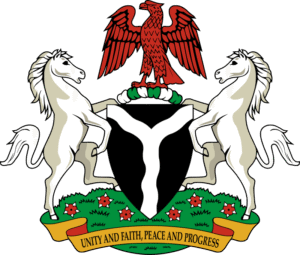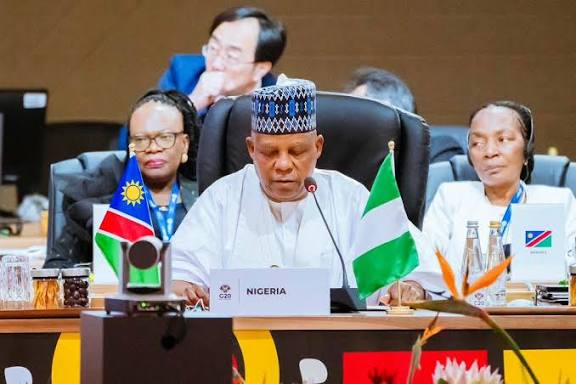Nigeria’s participation at the 2025 G20 Leaders’ Summit in Johannesburg was more than a diplomatic appearance; it signaled a deliberate move by the Tinubu administration to reset how the country is perceived in the global arena. At the centre of that effort was Vice President Kashim Shettima, standing in for President Bola Ahmed Tinubu, projecting a clearer, more coherent Nigerian voice on reform, security and investment.

From plenary sessions to targeted investment forums and business dialogues, the Presidency used the G20 platform to shift Nigeria’s posture from complaint to competence, from lamenting marginalisation to actively shaping its own economic opportunities.
The Tinubu Presidency’s Core Message at G20: Reform, Stability, Partnership
Throughout the summit and side events, Shettima — on behalf of President Tinubu and the Nigerian Presidency — anchored Nigeria’s message around four central pillars:
■ Reform is real, not rhetorical
The delegation underscored that Nigeria is in the middle of tough but necessary economic measures: fuel subsidy removal, foreign exchange reform, fiscal tightening and a push to expand the productive base of the economy. These are politically costly decisions, but they were presented as essential to restore long-term fiscal and macroeconomic stability.
■ Security and stability are non-negotiable
Shettima made it clear that investors cannot thrive in an environment defined by banditry, terrorism and kidnapping. He stressed that the Tinubu administration recognises security as the foundation of any investment agenda and highlighted ongoing efforts to stabilise key corridors, protect farmers, improve intelligence coordination and rebuild confidence in the state’s capacity to secure lives and property.
■ Partnership, not dependency
Rather than pleading for aid, the Presidency positioned Nigeria as a partner seeking trade, investment, technology transfer and joint ventures. The focus was on agriculture, solid minerals, energy, manufacturing, infrastructure, logistics and digital innovation — sectors where Nigeria has scale and latent competitiveness, but needs capital and expertise to unlock full value.

■ Africa’s largest economy must act like it
Nigeria was framed as a natural anchor for West Africa and an important voice in global debates on climate transition, food security, supply chains, energy access and demographic trends. The message: a reformed, more stable Nigeria is not just good for Nigerians, but for regional and global stability.
Shettima’s calm but firm delivery, backed by detailed inputs from Finance Minister Wale Edun and senior economic advisers, signalled that the Tinubu administration understands the complexity of Nigeria’s challenges and is prepared to take hard decisions — and to defend them on the world stage.
From Diplomacy to Deals: Governors as Operational Arms of the Presidency
Supporting the Presidency’s federal pitch was a select group of nine governors, invited to bring state-level opportunities directly to the G20 investment table. According to official briefs and partner documentation, the investment dialogue featured:
Senator Uba Sani – Kaduna
Alh. Dauda Lawal – Zamfara
Engr. Abdullahi Sule – Nasarawa
Senator Ademola Adeleke – Osun
Caleb Manasseh Mutfwang – Plateau
Mohammed Umaru Bago – Niger
Peter Ndubuisi Mbah – Enugu
Muhammad Inuwa Yahaya – Gombe
Dikko Umar Radda – Katsina
Their role was not ceremonial. Under the umbrella of the Tinubu Presidency’s reform message, these governors acted as operational arms of Nigeria’s investment drive:
Showcasing state-specific assets in agriculture, mining, energy, industrial parks, logistics and services.
Demonstrating that reform and openness to investment are not confined to Abuja, but extend across the federation.

Signalling that sub-national governments are ready to implement projects, not just sign MoUs.
This created, for the first time in a long while, a federal–state investment marketplace abroad: the Presidency providing policy assurance and strategic direction, and governors providing pipelines of concrete, localised opportunities.

Kaduna and PMT: A Case Study of the G20 Opportunity
One clear example of how this new approach can translate diplomacy into development is the engagement between Kaduna State and Precious Metals Tswane (PMT), a respected South African refinery with strong credentials in processing precious metals.
At the summit, Kaduna presented itself as an investment-ready state, with clear priorities in Agriculture, Transport, Solid Minerals and Renewable Energy, and signature initiatives such as:
The Special Agro-Processing Zone (SAPZ)
The Africa Quality Assurance Centre (AQAC)
An integrated transport policy, including CNG-powered buses and planned rail/BRT corridors
A push for clean, decentralised energy to support industry and communities
In a focused session, Kaduna’s delegation met with PMT leadership. PMT tabled an ambitious proposal to:
Establish an aggregation and processing centre in Kaduna State
Purchase and process raw materials from artisanal and small-scale miners
Drive technology transfer and capacity building for Nigerian operators in the precious-metals value chain

Operate under strict Environmental, Social and Governance (ESG) standards
Leverage its capacity to process up to two tonnes of precious metals daily
If fully realised, this model would shift Nigeria’s role in the precious-metals ecosystem away from raw, informal extraction toward structured, value-added processing and global market integration, with Kaduna as a hub. It is exactly the kind of outcome the Tinubu Presidency framed at the G20: reforms at the top, serious investors at the table, and states ready to host long-term, high-value projects.
Other States, One National Story
While the Kaduna–PMT case stands out as a tangible illustration, other governors aligned their presentations with the same national story:
Katsina pitched itself as an emerging frontier for agriculture, agro-processing, renewable energy, digital innovation and light manufacturing.

Plateau emphasised sustainable mining, mineral beneficiation and renewable energy, seeking to turn a historic mining region into a modern, globally integrated resource hub.
Nasarawa focused on solid minerals and regional industrialisation, positioning North-Central Nigeria as an investment corridor rather than just a transit zone.
Osun, Niger, Enugu, Gombe and Zamfara highlighted combinations of formalised mining, agribusiness, hydropower, gas development, logistics, SMEs and tourism, reinforcing the point that investable opportunities exist across multiple states.
The common thread was clear: under Tinubu’s reform umbrella, Nigerian states are no longer waiting passively for federal allocations; they are stepping forward as active players in the global economy.
Why the Presidency’s G20 Outing Matters
Several elements of this G20 performance are strategically important for Nigeria:
The Presidency spoke the language of investors: policy consistency, risk management, returns, and long-term stability — rather than vague promises or crisis narratives.

It explicitly linked security to economics, acknowledging that tackling banditry, terrorism and kidnapping is fundamental to investment and development.
It projected federal–state alignment on investment, showing Nigeria not as a single congested centre, but as a network of viable sub-national economies.
It framed Nigeria as a partner seeking mutual benefit through trade, technology and value addition, instead of a perpetual plea for aid.
This combination helps to rebuild credibility: it tells partners and investors that Nigeria understands both its internal responsibilities and its external opportunities.
From Johannesburg Back Home: The Real Test
The G20 Summit has given the Tinubu Presidency what Nigeria has lacked for some time: a coherent, confident and policy-anchored appearance on a major global platform, with clear support from a cross-section of governors.
But the value of that outing will not be measured in applause in Johannesburg; it will be measured in outcomes at home:
Whether security operations start to deliver visible improvements along roads, in farming belts and in vulnerable communities.
Whether investment conversations turn into signed agreements, construction, plants, processing centres and real jobs.
Whether reforms are refined to protect the most vulnerable, without abandoning the goal of long-term sustainability.
Whether the federal–state alignment on display abroad translates into coordinated, disciplined execution inside Nigeria.
If those conditions are met, this G20 engagement may be remembered as the moment the Tinubu administration stopped merely attending high-level meetings and instead used them to decisively reposition Nigeria in the community of nations — with Shettima’s stewardship in Johannesburg marking a turning point in how the country presents and conducts itself globally.

The National Patriots
Headlinenews.news Special report, Johannesburg, SA.



